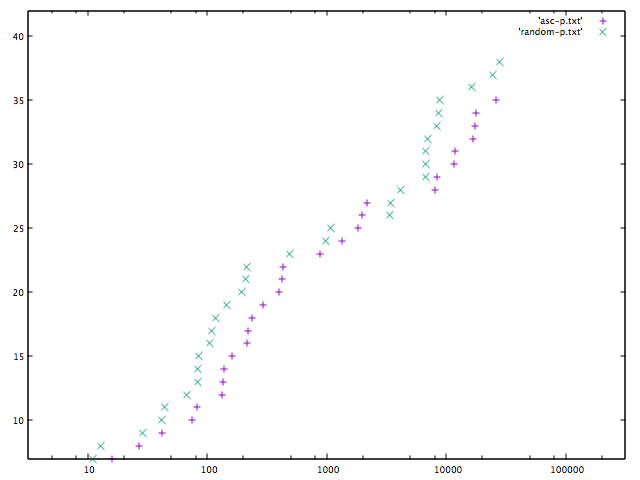I recently implemented Treap, one of various kinds of binary search trees (BSTs), on Rust. It is a balanced BST, which means that it ensures that tree depth is always  where n = (the number of items in a tree). That is achieved by using randomisation. (For more details see Treap — Wikipedia.)
where n = (the number of items in a tree). That is achieved by using randomisation. (For more details see Treap — Wikipedia.)
Experiments
Here are results of some experiments:
(1) Insertion of 10000 elements in the ascending order:
http://ideone.com/tSrw7u
It took 11.7 seconds to insert 30000 elements in the ascending order, and it got Time Limit Exceeded (>15.0sec) when the number of elements is >100000. You'll see that the depth of the treap increases in logarithmic speed.
(2) Insertion of 10000 elements in a random order:
http://ideone.com/yxVe6d
It took 11.8 seconds to insert 30000 elements in a random order. Like (1), the depth of the treap increases in logarithmic speed, too.
Here is a graph that indicates how the depth of the treap grows as the number of elements increases. 
Conclusion
We have a balanced BST, whose depth is bounded by  !
!
Unfortunately, a solution (25637342) to 785E - Антон и перестановка that uses this treap, which should work in  -time, got the Time limit exceeded verdict. That seems because of its heavy constant factor, but I'm not sure.
-time, got the Time limit exceeded verdict. That seems because of its heavy constant factor, but I'm not sure.
References
The code I used in these experiments is avaliable at: https://github.com/koba-e964/contest/blob/906fcb07057b72496407b3c6e6a422e48e60dc6f/comm/Treap.rs
http://ideone.com/tSrw7u
http://ideone.com/yxVe6d
This implementation of treap largely depends on the slide (https://www.slideshare.net/iwiwi/2-12188757, written in Japanese) by iwiwi. This implementation of treap is verified by http://arc061.contest.atcoder.jp/submissions/1172709 (AtCoder ARC 061 D, problem statement is avaliable at http://arc061.contest.atcoder.jp/tasks/arc061_b ).






